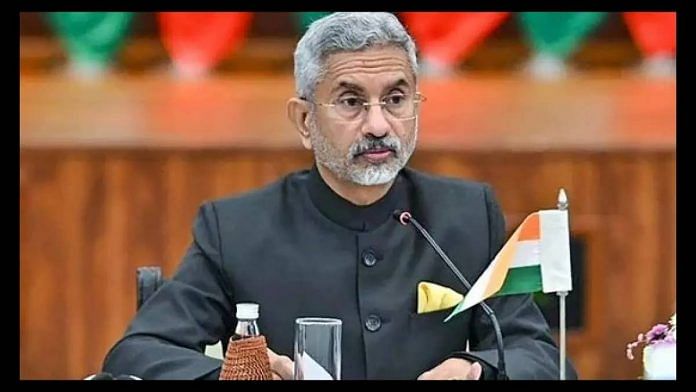New Delhi: External Affairs Minister S. Jaishankar will join fellow foreign ministers from the emerging economies of Brazil, Russia, India, China and South Africa (BRICS) in Cape Town Thursday where local currency trading is among the topics likely to dominate discussions.
South Africa, which currently chairs the bloc, is hosting the BRICS foreign ministers’ meeting in Cape Town from 1-2 June.
Analysts say China may push its 12-point peace plan for the Russia-Ukraine war at the meeting, but it is unlikely to find “consensus”.
The meeting will pave the way for the 15th BRICS summit later in August, which is expected to see the participation of Prime Minister Narendra Modi, Russian President Vladimir Putin, Chinese President Xi Jinping and other heads of state.
For Jaishankar and his Chinese counterpart, Qin Gang, this will be their third interaction this year, despite the ongoing border stand-off between India and China along the Line of Actual Control (LAC).
In the past few weeks, questions had loomed over Russian participation in BRICS meetings, given the International Criminal Court’s (ICC) arrest warrant for Putin over alleged war crimes.
However, South Africa this week announced that it would issue blanket diplomatic immunity to all leaders attending the August summit.
South Africa has aimed to maintain a position of neutrality amid the Russia-Ukraine war by abstaining from votes relating to the conflict at the United Nations (UN) and on some occasions, offering itself as a potential mediator between the two sides.
However, it has also blamed the North Atlantic Treaty Organization (NATO) for the war in the past, and conducted military exercises with Russia and China in February this year.
Also Read: Jaishankar calls on SCO foreign ministers to support ‘New Delhi declaration’ & 4 joint statements
Economic cooperation among BRICS
Since the start of the Russia-Ukraine war, countries such as India, Russia, and China have begun settling trade in local currencies as opposed to the dollar.
According to Anil Trigunayat, a former Indian ambassador to Jordan, Libya and Malta who is also senior adviser with the BRICS Chamber of Commerce, such trading is likely to get encouragement at the foreign ministers’ meeting in Cape Town.
“The meeting will see greater focus on local currency trading as a result of the US’s so-called ‘weaponisation’ of financial instruments, confiscation of Russian reserves and shunting out of Russia from SWIFT (Society for Worldwide Interbank Financial Telecommunications),” he said.
The BRICS foreign ministers are also expected to discuss the prospect of a common currency.
In March this year, Russian lawmaker Alexander Babakov was quoted as saying by Sputnik News that leaders may “present ideas” about a joint currency at the August BRICS summit.
However, this would be tricky as BRICS economies are dramatically different in terms of their economic trade, growth, and financial openness. Further, it is unclear if India and China will find agreement amid an ongoing border standoff.
Trigunayat also questioned whether the common currency would be backed by gold or other benchmarks.
It is possible that technical concerns about local currency trading will be raised among the BRICS foreign ministers.
Last month, during the Shanghai Cooperation Organisation (SCO) Council of Foreign Ministers’ meeting in Goa, Russian Foreign Minister Sergey Lavrov had said that there were problems in the rupee-ruble system.
He explained that Moscow had accumulated “billions” of rupees in accounts in Indian banks but could not utilise it unless it was transferred to another currency.
Peace plans for Ukraine conflict
In last year’s joint statement, BRICS foreign ministers had promised to uphold international law and UN principles and said they “supported talks” between Russia and Ukraine.
This year has seen various countries including China and South Africa propose peace plans to end the conflict.
While China may push its peace plan at the meeting, it is “unlikely to invite total consensus”, according to Kamal Madishetty, senior researcher, Institute of Peace and Conflict Studies (IPCS).
“But there may be a wider discussion about the urgency to end the war, as well as in dealing with the impact of the Ukraine conflict on the Global South, especially on food and energy security,” he added.
Last month, South African President Cyril Ramaphosa said Putin and Ukrainian President Volodymyr Zelenskyy had agreed to meet a group of African leaders to discuss a potential peace plan.
(Edited by Nida Fatima Siddiqui)
Also Read: A combative Russian FM Sergey Lavrov gets called out for being ‘disrespectful’ at Raisina Dialogue



